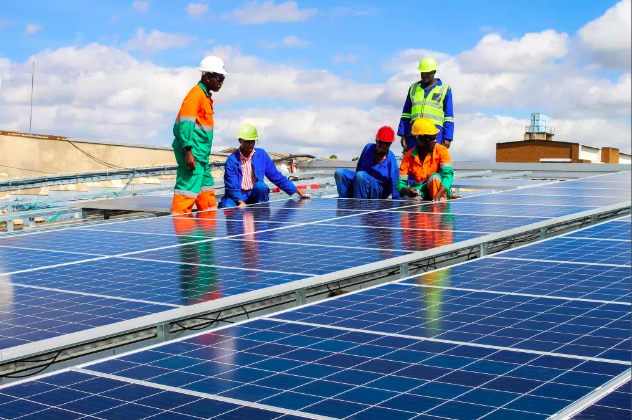The whirring sound of a diesel generator starts another day without electricity at a Total fuel station in Bulawayo. A long queue of motorists scramble to get served before the fuel runs out or the generator is switched off for a cooling period after six hours of non-stop use.
The station in the low-income suburb of Entumbane, which experienced disturbances during nationwide protests against a fuel price hike in January 2019, continues to trade. But Zimbabwe’s problems with power cuts and rapidly devaluing local currency have made business harder, prompting fuel supply irregularity and erratic pricing.
The government’s recent reversal of a ban on trading in foreign currency following last year’s restoration of the local Zimbabwe dollar will allow service stations to import fuel for sale in foreign currency. After nearly two years of persistent fuel shortages, the U-turn is intended to ease supplies for hard-pressed petrol stations. But Zimbabwe still faces many challenges in restoring smooth trading, and at Total Entumbane, erratic electricity supply continues to hamper daily operations.
Station manager Thula Mbambo tells African Business that lengthy power cuts experienced at least four times a week make daily operations difficult.
“We never know when we will have power back. Sometimes it’s there in the morning for a few hours then it goes the whole day, sometimes it’s not there and it comes late at night after the station has closed, making it difficult for us to operate under such circumstances. When we get product and there is no power we use the diesel we should be selling to customers to keep the generator on the whole day, so it eats into our margins. If we were to get solar panels it would really make things easier for us.”
Qetello Zeka, Total Zimbabwe’s managing director, says that company has already installed solar panels at six of its stations and plans to equip another 44, including Entumbane. As the first petroleum firm to turn to solar in Zimbabwe, the company is investing $4m in solar-powered service stations.
“Our plan is to solarise half of our stations in Zimbabwe over five years. We are committed to providing cleaner, better, reliable and tangible energy solutions. The frequent power cuts have increased service stations dependent on generator power usage, therefore increasing the operating costs.
“This shift is a more efficient solution which will reduce operating costs [as well as] energy dependence on the [national] grid and also minimise usage of alternatives like generators by 30%,” Zeka said in a statement.
The solar initiative is part of a larger project to install solar-powered service stations across 57 African countries in an effort to create a portfolio of low-carbon businesses that will account for at least 20% of the energy conglomerate’s trading by 2040.
Power cuts impact economy
Zimbabwe’s power cuts, which can last up to 18 hours a day, have deeply impacted industry, including the manufacturing and mining sectors, forcing some companies to run at night or cut back on shifts. After contracting by 8.3% in 2019 due to severe economic challenges and climate-related shocks, including floods and drought, Zimbabwe is expected to grow by just 2.7% this year, according to the IMF.
Following a working visit to Zimbabwe in February, the fund urged the government to take swift measures to correct “policy missteps” and restore macroeconomic stability. Soaring inflation, poor liquidity and low foreign currency reserves continue to adversely affect agricultural output, electricity production and fuel imports.
The Zimbabwe Power Company (ZPC), a state-owned enterprise, estimates that the country has a national energy deficit of 1,426 MW. Due to the ongoing drought afflicting the Kariba hydroelectric power station and periodic equipment failures at ZPC’s archaic Hwange coal plants, the country is estimated to generate only about 641 MW of electricity at present.
This makes it heavily dependent on imports sourced from the DRC, Mozambique and South Africa, but these can be unreliable. ZPC has a non-binding agreement to import up to 400 MW of electricity from South Africa’s Eskom Holdings, but the troubled South African company is already struggling to meet needs in its domestic market.
Private companies take initiative
In addition to Total, other private companies are taking the initiative, seeking out innovative solutions to the energy shortages.
Last year the country’s largest telecommunications provider, Econet Wireless, invested in Tesla lithium-ion batteries to power its base stations. After a series of blackouts, which periodically suspended mobile money transactions of more than $200m/day, Econet installed at least 520 batteries at its 1,300 network base stations to store up to 10 hours’ worth of power, which can keep a station running until electricity is restored.
Swiss cement manufacturer Lafarge Cement and beverage manufacturer Schweppes Africa Holdings have also installed photovoltaic solar plants at their main industrial premises to keep working during rationing periods.
Meanwhile, privately owned Matshela Energy is working on a 100 MW solar farm in the south-western district of Gwanda, intending to sell on the energy it generates to the state distributor, ZEDTC. The $250m project, which is headed by former Eskom CEO Matshela Koko, will be entirely dependent on private funding. As Fortune Chasi, Zimbabwe’s minister of energy, told Business Day last July: “Matshela Energy has to find the money to invest into this project, government will not pay a cent. Everything in the hands of the investors and if Matshela fails to deliver, it will be their own baby.”
The project could start feeding into the national grid within the next 12 months, but with previous projects struggling to reach completion, nobody is predicting a swift end to Zimbabwe’s years-long generation woes.






